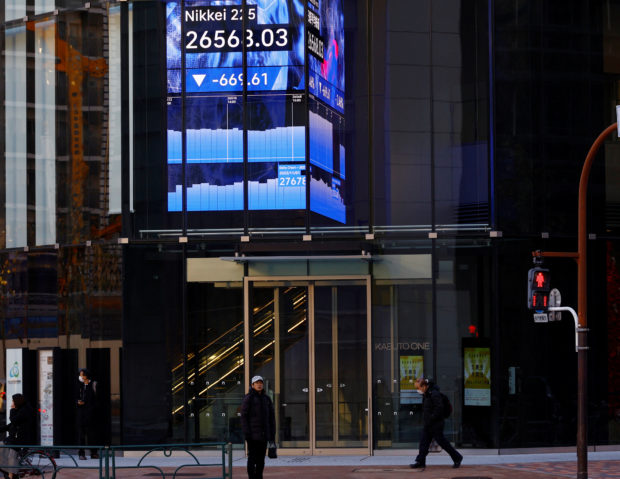
People walk past an electric board showing Nikkei index at a business district in Tokyo, Japan Dec 20, 2022. REUTERS/Kim Kyung-Hoon/File photo
SYDNEY – Asian shares tracked Wall Street lower on Thursday, as a number of Federal Reserve speakers echoed Chair Jerome Powell in saying that interest rates are set to go higher, capping risk sentiment, while the dollar hovered near one-month highs.
MSCI’s broadest index of Asia-Pacific shares outside Japan slid 0.3 percent. Japan’s Nikkei also fell 0.3 percent.
China’s blue chips eased 0.1 percent, while Hong Kong’s Hang Seng Index was down 0.2 percent, weighed by a larger fall of 0.7 percent in tech stocks.
On Wednesday, Alphabet Inc shares fell 7.7 percent after its new AI chatbot Bard delivered an incorrect answer in a promotional video, dragging the S&P 500 and Nasdaq lower by more than 1 percent.
Adding to the cautious mood, Federal Reserve officials said more interest rate rises are on the cards as the U.S. central bank moves ahead with efforts to control inflation. None hinted though that January’s strong jobs report could drive more aggressive policy actions.
“Now that inflation has passed its peak and many central banks have begun to slow the pace of policy tightening, markets are back to scouring their communications for evidence of what’s to come,” said Jennifer McKeown, chief global economist at Capital Economics.
“But despite the strong push for transparency over the past two decades, central banks are struggling to convey the right message with conflicting data adding to confusion about the inflation outlook in a post-pandemic world.”
On Wednesday, New York Fed President John Williams said moving to a federal funds rate of between 5 percent and 5.25 percent “seems a very reasonable view of what we’ll need to do this year in order to get the supply and demand imbalances down.”
Governor Christopher Waller said the battle to reach the Fed’s 2 percent inflation target “might be a long fight”. But Governor Lisa Cook said the big job gains in January with moderating wage growth increased hopes of a “soft landing”.
U.S. Treasury Secretary Janet Yellen said that while inflation remained elevated, there were encouraging signs that supply-demand mismatches were easing in many sectors of the economy.
The bond market rallied a little after being caught wrongfooted by the January blockbuster U.S. jobs report, forcing many to reposition for a higher peak in the Fed funds rate.
The two-year Treasury yield, which rises with traders’ expectations of higher Fed fund rates, eased 2 basis points to 4.4375 percent on Thursday, while the yield on benchmark 10-year Treasury notes slid 5 basis points to 3.6012 percent.
Futures are pricing in the Fed’s target rate to peak at 5.132 percent in July, about 25 basis points higher than last week, and that by December it will have declined to 4.813 percent, a jump of about 40 basis points since a week ago.
In the currency markets, movements were rather muted. The dollar index held close to a 1-month high at 103.45 against major peers, after last week’s stunning jobs and services data.
In the oil market, Brent crude futures eased 0.2 percent to $84.90 while U.S. West Texas Intermediate (WTI) crude also settled 0.1 percent lower at $78.36.
Gold was slightly lower. Spot gold traded at $1,872.48 per ounce.

